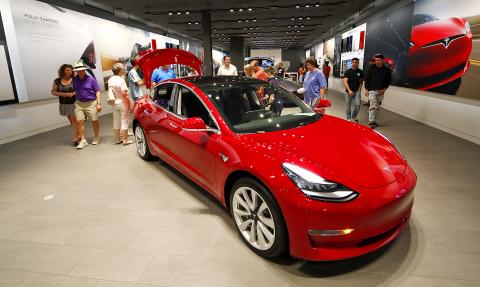Electric-car maker Tesla Inc on Wednesday reported a “historic” quarterly profit driven by demand for its mass market Model 3 as the company looks beyond its US home base to Europe and China.
Tesla chief executive officer Elon Musk said he expects the company to stay profitable from this point forward, and addressed company debt and snags ramping up production line efficiency.
Musk said he expected the company to make even more Model 3 vehicles in the current quarter and to begin delivering the cars in Europe and China early next year.

Photo: AP
“I am incredibly excited about what lies ahead,” Musk said in an earnings call with analysts.
Tesla said third-quarter net income reached US$311.5 million on revenue that more than doubled year-on-year to US$6.8 billion.
The earnings beat Wall Street expectations that Tesla would take in less money in the quarter and log another loss.
Tesla shares leapt 9.8 percent to US$316.80 in after-market trades after the earnings release.
For the same period a year earlier, the company reported a loss of US$619 million.
“Q3 2018 was a truly historic quarter for Tesla,” Musk said. “Model 3 was the best-selling car in the US in terms of revenue and the fifth best-selling car in terms of volume.”
Tesla’s assembly line produced an average of 4,300 cars weekly in the quarter, nearing a goal set by Musk.
The firm has also improved efficiency, ramping up the gross margin on Model 3 vehicles to more than 20 percent, Musk said.
Model 3 cars start at about US$50,000, despite a Tesla goal of making an electric car priced for the masses.
Musk said his aim is to get the Model 3 price down to US$35,000, with a production cost of less than US$30,000.
“That is our goal, and that is what we are pushing very hard to achieve,” he said.
Musk told analysts that Tesla was not starving development of new vehicles to feed profitability.
Tesla has made significant progress on a Model Y, with a prototype set for production, and is continuing to develop an electric semi truck as well as a new roadster model, Musk said.
Tesla executives expect to begin delivering Model 3 cars in Europe in the first quarter of next year, and in China by the second quarter.
Production is to initially take place in California, but Tesla is “moving rapidly” to get production going in China and wants to have that going next year, he said.
“We will also have a factory in Europe long term, because it is pretty silly to make cars in California and ship them to Europe,” he said.
The Model 3 would be available in Australia and the UK in about the middle of next year, he said yesterday.
In response to a tweet asking when the Model 3 will be available in Australia, Musk wrote: “Around mid 2019,” later tweeting that it would also be available in the UK during the same period.
Additional reporting by Reuters

MULTIFACETED: A task force has analyzed possible scenarios and created responses to assist domestic industries in dealing with US tariffs, the economics minister said The Executive Yuan is tomorrow to announce countermeasures to US President Donald Trump’s planned reciprocal tariffs, although the details of the plan would not be made public until Monday next week, Minister of Economic Affairs J.W. Kuo (郭智輝) said yesterday. The Cabinet established an economic and trade task force in November last year to deal with US trade and tariff related issues, Kuo told reporters outside the legislature in Taipei. The task force has been analyzing and evaluating all kinds of scenarios to identify suitable responses and determine how best to assist domestic industries in managing the effects of Trump’s tariffs, he

TIGHT-LIPPED: UMC said it had no merger plans at the moment, after Nikkei Asia reported that the firm and GlobalFoundries were considering restarting merger talks United Microelectronics Corp (UMC, 聯電), the world’s No. 4 contract chipmaker, yesterday launched a new US$5 billion 12-inch chip factory in Singapore as part of its latest effort to diversify its manufacturing footprint amid growing geopolitical risks. The new factory, adjacent to UMC’s existing Singapore fab in the Pasir Res Wafer Fab Park, is scheduled to enter volume production next year, utilizing mature 22-nanometer and 28-nanometer process technologies, UMC said in a statement. The company plans to invest US$5 billion during the first phase of the new fab, which would have an installed capacity of 30,000 12-inch wafers per month, it said. The

Taiwan’s official purchasing managers’ index (PMI) last month rose 0.2 percentage points to 54.2, in a second consecutive month of expansion, thanks to front-loading demand intended to avoid potential US tariff hikes, the Chung-Hua Institution for Economic Research (CIER, 中華經濟研究院) said yesterday. While short-term demand appeared robust, uncertainties rose due to US President Donald Trump’s unpredictable trade policy, CIER president Lien Hsien-ming (連賢明) told a news conference in Taipei. Taiwan’s economy this year would be characterized by high-level fluctuations and the volatility would be wilder than most expect, Lien said Demand for electronics, particularly semiconductors, continues to benefit from US technology giants’ effort

‘SWASTICAR’: Tesla CEO Elon Musk’s close association with Donald Trump has prompted opponents to brand him a ‘Nazi’ and resulted in a dramatic drop in sales Demonstrators descended on Tesla Inc dealerships across the US, and in Europe and Canada on Saturday to protest company chief Elon Musk, who has amassed extraordinary power as a top adviser to US President Donald Trump. Waving signs with messages such as “Musk is stealing our money” and “Reclaim our country,” the protests largely took place peacefully following fiery episodes of vandalism on Tesla vehicles, dealerships and other facilities in recent weeks that US officials have denounced as terrorism. Hundreds rallied on Saturday outside the Tesla dealership in Manhattan. Some blasted Musk, the world’s richest man, while others demanded the shuttering of his